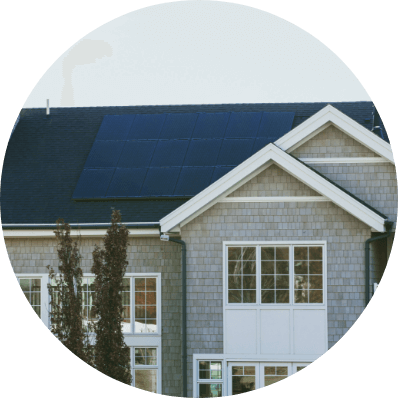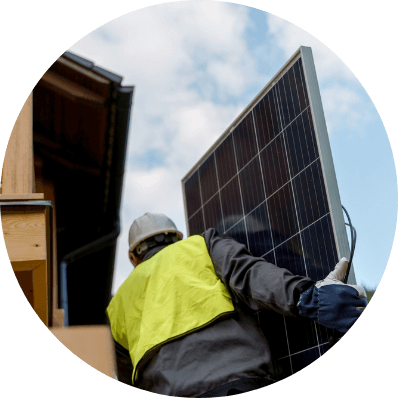What is Solar Energy? The Ultimate Guide


The sun is a massive, hot sphere of gas that emits incredible amounts of energy into space in the form of heat and light, referred to as solar energy. The amount of solar energy that reaches Earth’s surface in 60 minutes is enough to power the globe’s energy needs for an entire year!
Without the sun, we wouldn’t have any of the energy sources we rely on every day. The light and heat from the sun grow the plants that eventually become gas, wood, and coal and drive the air and water currents that power wind turbines and hydroelectric dams. Unfortunately, our society is not using this powerful renewable resource to its fullest extent. In fact, less than 3%1 of all U.S. energy production comes directly from solar energy.
That’s why entrepreneurs, government agencies, and researchers are trying to make it more affordable and efficient to use solar directly as a primary energy source. By cutting out the middleman between the sun and the energy we consume, we can take full advantage of our most powerful and prevalent source of renewable energy.
Keep reading to learn more about what solar energy is and how going solar can electrify your life.
The Pros and Cons of Solar Energy
Solar energy has benefits and drawbacks, and it’s essential to weigh both as you determine the right energy choice for your goals and lifestyle. Here are some of the biggest pros and cons to be aware of if you’re considering switching to solar.
Pros
Solar energy is clean, mostly inexpensive, and renewable, and researchers expect its availability to last for 5 billion years2. This makes it the most abundant form of renewable energy we have. What’s more, the United States is optimally positioned and has some of the world’s richest solar potential. Read about more solar advantages below.

Did you know?

Reduces Utility Costs
Did you know that electricity rates have increased 15.8% just in the last year because of rising natural gas prices? If you’re like most people, you’re trying to save on your monthly electric bill — and one of the easiest ways to achieve lower electric costs is to harness solar energy.
Making the transition to solar doesn’t just save you money on your electricity bill; the government wants to reward people who opt for safe, renewable energy, so you may earn money in the form of tax credits, rebates, and state incentives for making the switch.

More Sustainable
The oil, natural gas, and other energy resources we use today are quickly disappearing. At the rate we’re using them, they could be depleted in 50 years. On the other hand, the sun’s power is expected to be stable for billions of years to come.
Solar energy is not only being generated on individual homes but through solar farms and commercial installations that can provide renewable power on a larger scale. By combining all types of solar deployments we can transition more of our energy usage to this more sustainable power source.

Better for the Environment
The fossil fuels we use to power our cars and heat our homes release harmful amounts of CO2 when burned. These emissions trap heat in the atmosphere and pollute the air, increasing the temperature of the globe.
Solar energy produces fewer carbon emissions, helps us achieve cleaner air, and slows the pace of climate change.

Easy to Maintain
Solar panels, which are used to transform sunlight into usable electricity, are very easy to maintain; you can almost “set and forget” them. With no moving parts prone to damage, all you really need to do is keep an eye on your panel, ensuring it stays free of debris to maintain efficiency.
Panels usually have extended warranties, so you can count on them to serve you well for decades. At Axia Solar, we proudly offer a 30-year warranty on performance as well as a 25-year workmanship and product warranty — and we handle all warranty claims.

Promotes Energy Independence
As a consumer of electricity from the grid, you are subject to volatile market conditions, including price fluctuations and shortages that result from domestic and international crises. However, when your home runs on solar energy, you won’t have to worry about that as much because you have a consistent and reliable energy source, and its price and availability aren’t subject to market conditions.

Reduces Strain on the Electrical Grid
The grid is under a lot of strain due to aging infrastructure and increasing demand. Power outages are increasing, with blackouts up by 60% from 2015 to 20203. Those who use solar reduce the demand and stress on the electrical grid, preventing more blackouts and reducing electricity costs.
Cons
While the advantages of solar energy far outweigh the disadvantages, solar may not be the best choice for everyone. Here are a few of the drawbacks to be aware of.
Upfront Expenses
Installing a solar system for the first time is an investment. Each provider has a unique pricing model, which varies based on where you live, how many panels you need, and the labor cost — but remember that any expense will pay itself off over time through energy savings. In most cases, solar providers offer a loan product requiring $0 down, so while you may take on some debt, you can eliminate the upfront expense entirely if you choose to finance.
Space Requirements
The larger your property, the greater your electricity needs — which means the more solar panels you’ll require. Solar panels need a fair amount of space on your rooftop where the sun can reach the panels without obstruction. Solar may not be a practical choice for your house if your space is limited — unless you opt for high-efficiency solar panels. Some manufacturers, like Qcells, offer panels with high watts, which means you get more power with less panels and less demands on your rooftop space. High-efficiency solar panels are ideal for small rooftops!
Subject to Environmental Conditions
The amount of solar energy production may differ across times, locations, seasons, and weather conditions. For example, during sunny months, your system may produce more energy than in the winter and on cloudy days. When the system isn’t generating solar energy, your utility provider will continue supplying electricity for your home to draw on. This is why your home remains connected to the grid despite having a solar system. Fortunately, many of today’s solar panels can produce energy no matter the weather conditions.
How Does Solar Energy Work — and What is it Used for?
Solar energy has been harnessed by humans to help improve daily life for centuries. It can be used to generate electricity, provide light, and heat water. Homes and businesses use two main types of solar technologies to heat and cool their spaces and warm their water — photovoltaic solar energy (for electricity generation) and concentrated solar-thermal power (for thermal energy production).

Photovoltaic Solar Energy
Photovoltaic (PV) solar energy is named after the photovoltaic effect, which is the phenomenon of converting light particles into energy. Solar panels are PV devices, which means they absorb sunlight to generate electricity with semiconducting materials like silicon. PV technologies can power small handheld electronics all the way up to entire homes and businesses.
Concentrated Solar Energy
Another way electricity is generated through solar is by using thousands of mirrors to reflect the sun’s light onto a tower. The tower then captures the heat and creates steam that flows through a turbine to produce electricity, which can be used immediately or stored for future use. This type of system is used to power large plants to desalinate water, process food, and so forth.
Ready to Electrify Your Life?
Isn’t it amazing what simple sunlight can do? We think so — and that’s why our mission is to help as many people as possible discover the empowerment behind energy independence. If this article has inspired you to go solar, get in touch with us today to get a custom quote from a Solar Advisor. We’ve pledged to make the solar transition as seamless and simple as possible!
Learn More
Want to learn more about how solar works? Check out these related articles. Have a question you can’t find an answer to? Contact us or chat live with an expert today.
